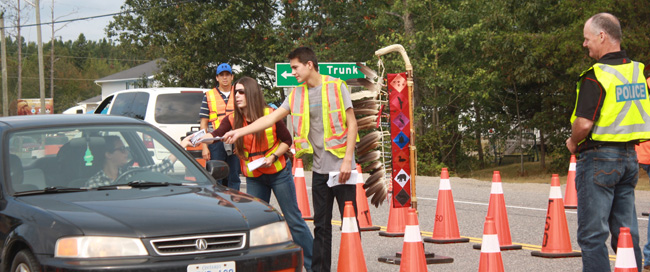Traditional Ecological Knowledge Elders educating people about the hazards of herbicides


By Leslie Knibbs
MISSISSAUGI FIRST NATION – In their vigilant efforts to notify others of the dangers of the Glyphosate, Traditional Ecological Knowledge (TEK) Elders gave out information pamphlets to drivers along Highway 17 at Mississaugi First Nation for two hours informing people on the hazards of aerial spraying of the herbicide.
With Health Canada’s mandatory ten year re-evaluation on the safety of Gylphosate nearly complete, the Elders of the North Shore held a peaceful demonstration at Mississaugi First Nation on Friday, August 29.
Glyphosate is a herbicide used in aerial spraying that is classified by an agency of the World Health Organization as probably carcinogenic to humans; the agency concurs there is convincing evidence that the chemical is indeed carcinogenic on animals. When determining how much risk is involved, the agency claims it depends on exposure. If exposure is high over a long period of time, the risk is doubled. Earlier this year a position paper stating the elders concerns along with a petition to stop the use of aerial spraying was given to Health Canada by TEK with assistance from MP Carol Hughes. As of this date, neither TEK nor Hughes has had a response from the agency. With the agency’s importance of scientific evidence when doing the re-evaluation, the elders are insisting their traditional ecological knowledge should be considered scientific evidence.
A request by the Elders for a meeting with Health Canada to give oral testimony has received no reply.
In addition to the meeting request, and a legitimate claim of scientific knowledge based on traditional ecology, TEK claims treaty rights recognized and affirmed in section 35 (1) of the Constitution Act of 1982 giving First Nations the rights to water and to hunt, fish and gather berries and plant medicines in traditional territories are being violated. Elders assert the use of aerial spraying of Glyphosate and the damage it causes to plants, water, and animals not only infringes on these rights but is a clear violation of the constitution.
Prior to beginning the demonstration, Deputy Grand Council Chief Glen Hare welcomed the people telling them it “was all of our responsibilities” to try to stop the aerial spraying. “We are the keepers here and we must work together to protect the water, medicinal plants and wildlife. Without them we’re done,” he said. Hare told those attending all but two of the First Nations in Ontario are behind the elders in their cause to stop aerial spraying. According to Hare “Lake Helen First Nation and Pic Mobert First Nation are not in full support,” he added that, “it is their right to go their own way in what they feel is the best interest of their community.” At a recent summit of Chiefs, however, a resolution was carried to support TEK’s goal.
Elders along with MP Carol Hughes and Charlie Smith from Massey asked travelers along the highway to support a ban on the use of all herbicides. Hundreds of vehicles slowed to take a pamphlet from the demonstrators with only a couple of exceptions, most travelers were polite and courteous taking the information for reading. However according to two of the demonstrators one vehicle occupant mouthed the “f” word while another gave the middle finger. A group from Sudbury, “Stop Aerial Herbicide Spraying On The Sudbury Forest” including Melanie LaQuerre and Gerry Kingsley were also demonstrating with the elders handing out pamphlets. With a common goal the elders and the Sudbury group have formed an alliance to educate the public on the dangers of aerial spraying. LaQuerre said she started the group in July of this year and just over a month into organizing, there is much interest in their activities. She expects membership in the group to increase. Shortly after starting up, the group had 600 people sign an online petition to stop aerial spraying.
Two hours after standing in the middle of the Trans Canada Highway educating travelers on the dangers of aerial spraying, all demonstrators joined hands and took part in a Round Dance while those stopped in traffic looked on. Following the dance, Grand Council Chief Pat Madahbee spoke of seeing moose with tumours in the forests. Calling the spraying “totally unacceptable,” Madahbee asked “when are they ever going to stop this (aerial spraying) insanity?” With a federal election looming, Deputy Grand Council Chief Glen Hare had the last word making it clear putting a ban on aerial spraying is a political issue. Glancing around the crowd, he said, “look around people, there are two women here today representing political parties, one party is missing.” MP Carol Hughes, the NDP incumbent was present talking to people and taking part in the demonstration by handing out pamphlets, while Heather Wilson, Liberal hopeful from Espanola was there talking to demonstrators.
Local OPP officers along with the provincial liaison officer assisted with traffic control making certain peace and safety was maintained for all, and charter rights were maintained. With the hope of making the banning of aerial spraying a political issue, concerned citizens are anxious to get all their candidate’s stand on this very important issue. The province of Quebec as well as many countries have banned the use of Glyphosate as a result of health concerns and damage to forest lands and water.
Elders state in their mission statement, “We have a right to clean air, water, soil and forests. We need to respect and protect this beautiful land and all of its amazing plant and animal life. We have a voice and need to be heard. Lets speak up and stand together.”
In the past, when re-evaluating the safety of a chemical, Health Canada has relied on scientific evidence presented. According to a representative from the agency, there is much weight put on what the Environmental Protection Agency (EPA) knows of the safety of any given chemical when making a decision as well as other groups’ scientific studies. The Sierra Club cites several studies indicating exposure to Glyphosate can include destruction to red blood cells, lung dysfunction, low blood pressure, kidney damage, erosion of the gastrointestinal tract, dizziness, fever and nausea to name a few.
Elders Willie Pine and Raymond Owl believe by educating and informing others, more people will recognized the dangers of aerial spraying and support a ban.

